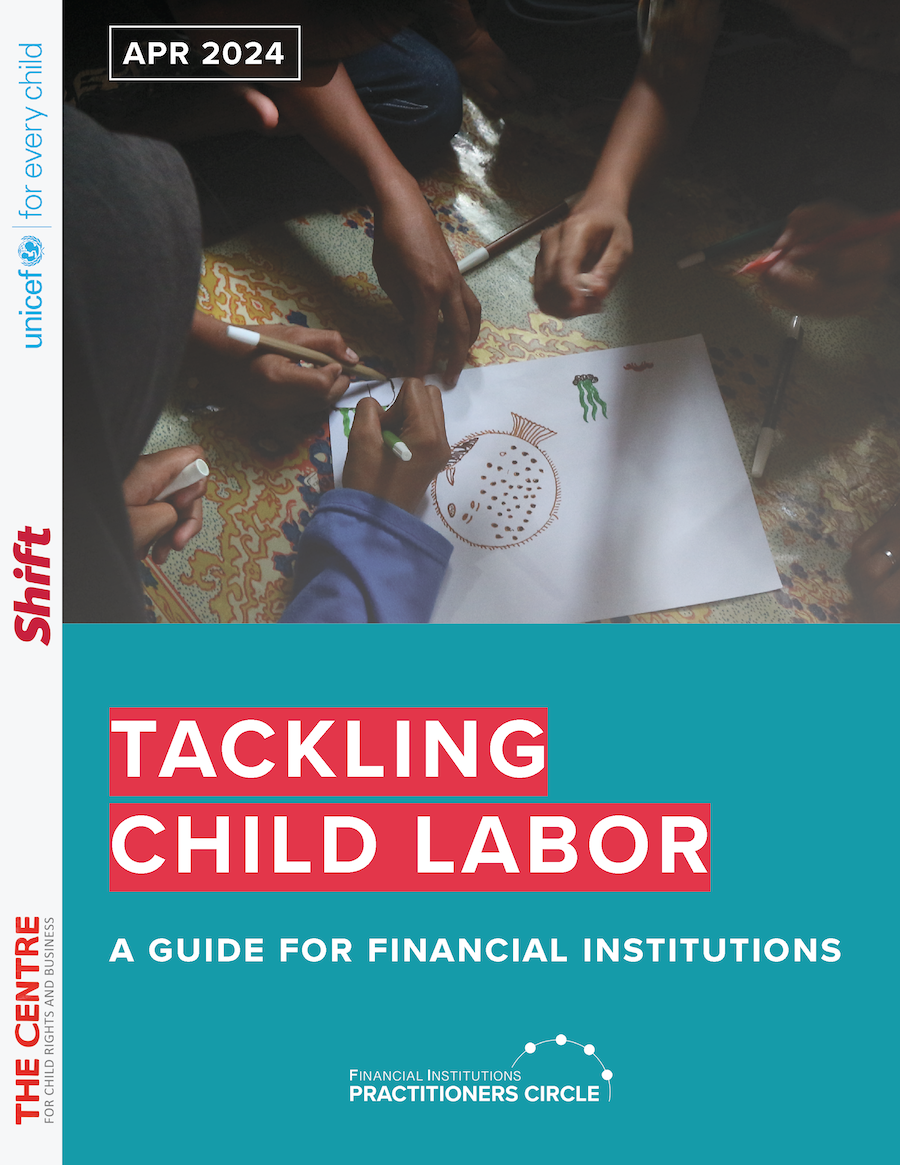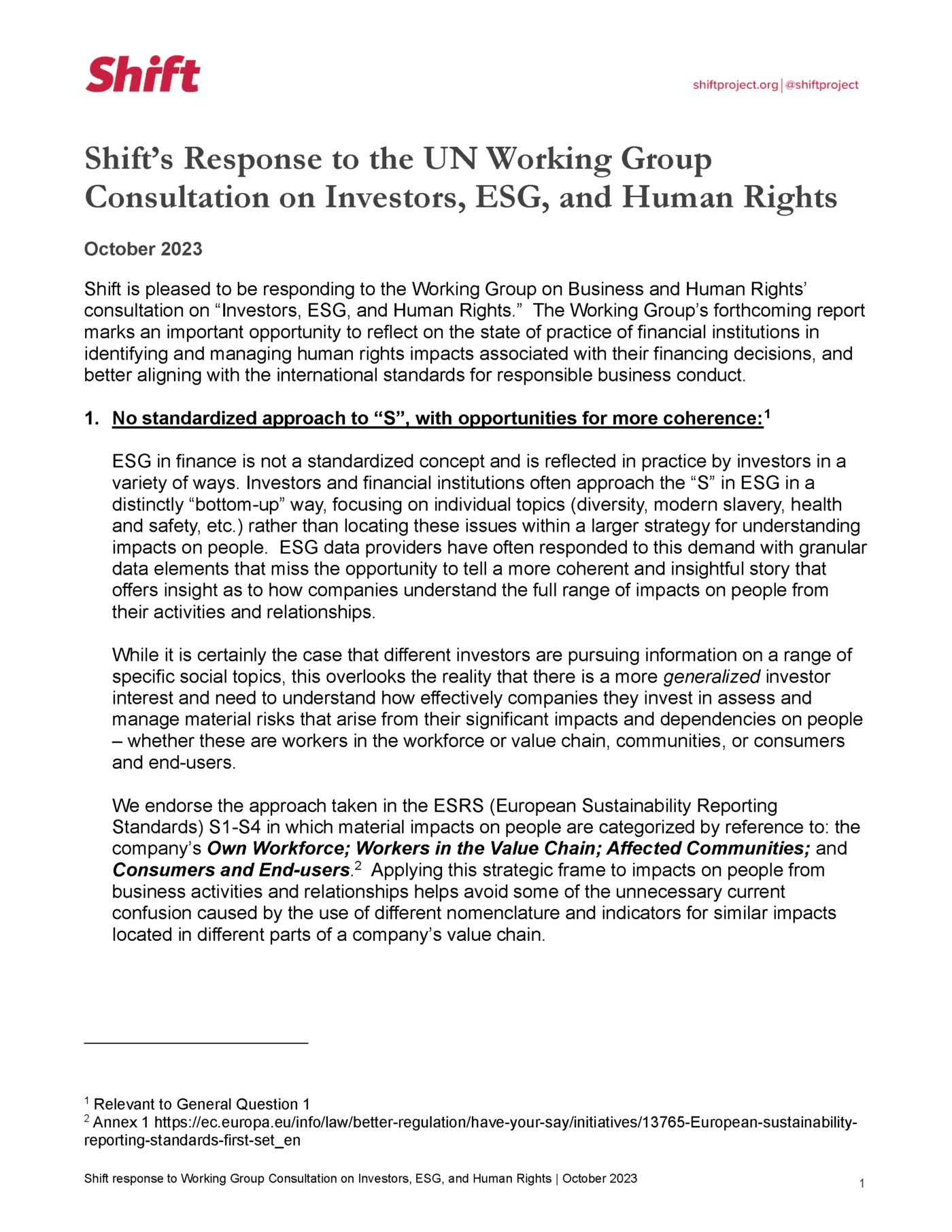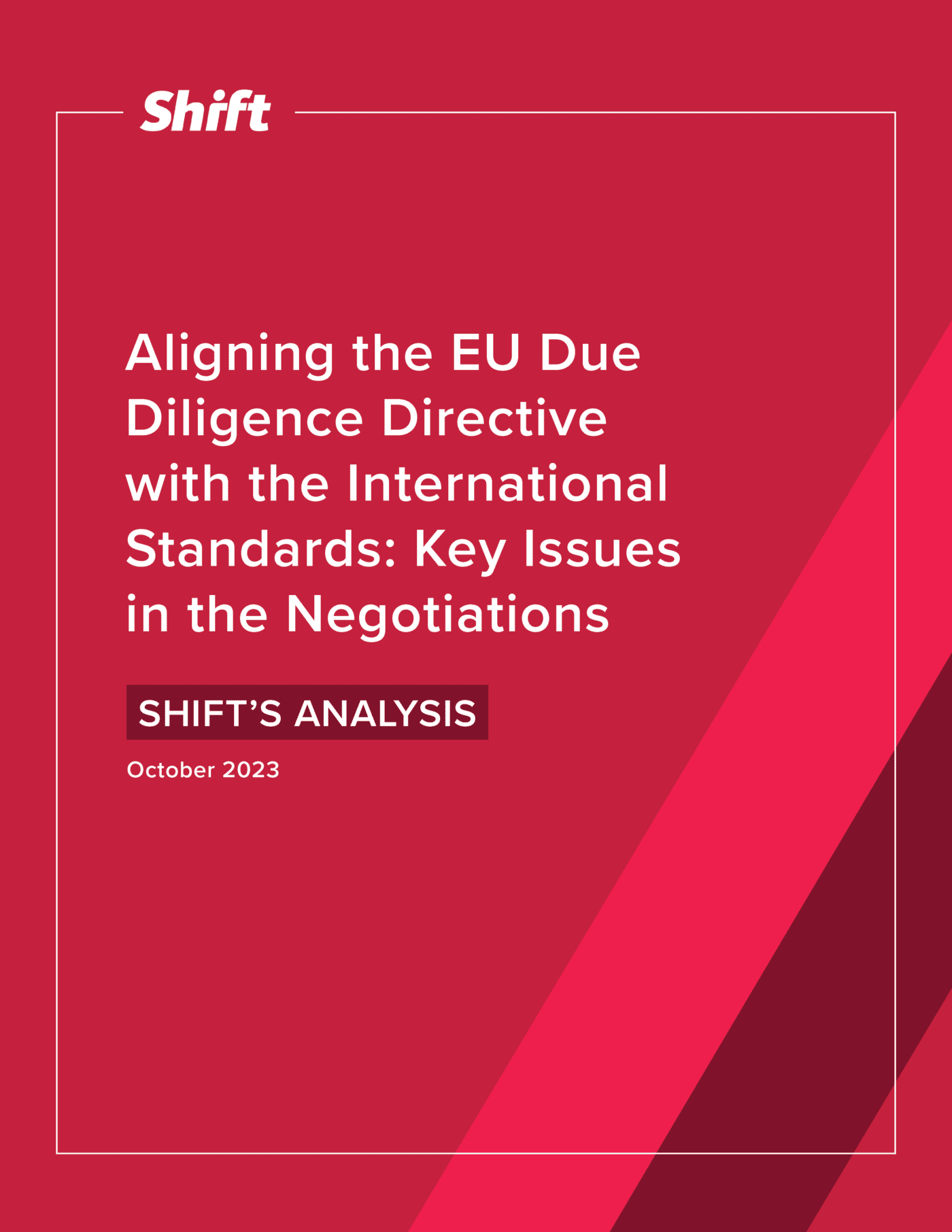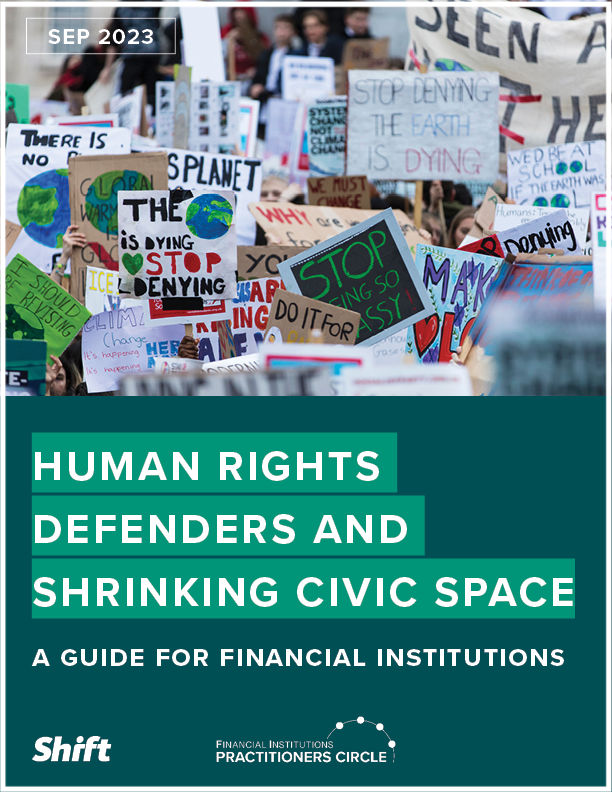Also see: Shift’s reporting program | our resource library section on policy and regulations, including reporting requirements
On June 9, the UK’s Financial Reporting Council (FRC) published guidance on the standards for corporate reporting that were introduced last year in the revised UK Companies Act. That law requires that all quoted companies report publicly on environmental matters, the company’s employees, and social, community and human rights issues, where this information is, “necessary for an understanding of the development, performance or position of the company’s business.”
Particularly significant here is the explicit inclusion of a requirement for human rights reporting. Indeed, the UK is not alone in taking this step towards greater transparency on companies’ human rights performance. Since 2011, when the United Nations Human Rights Council endorsed the Guiding Principles on Business and Human Rights, we have seen a clear trend among regulators, stock exchanges and investors calling for more disclosure in this important area of corporate performance. Be it Danish, French, US or other regulatory reporting requirements; pressure from stock exchanges in India, Thailand and elsewhere; or shareholder resolutions calling for greater transparency of companies’ human rights risk management, the message is clear: companies that are not yet addressing respect for human rights as part of their core operations have a dangerous blind spot – one that places at risk not only the welfare of the societies in which they operate, but also their own sustainability and success.
The new FRC guidance is a product of this reality. The UK Companies Act on which it is based requires quoted companies to reflect on whether providing human rights information to its shareholders is necessary for an understanding of their business. Many companies have simply never asked themselves this question. The many costs that can accrue to companies (let alone to societies) from a failure to manage human rights risks associated with their operations often go unidentified, buried within budget lines for permitting, litigation, human resources, sourcing, communications and similar activities. When they are accounted for correctly, the results can be shocking.
Recent research co-authored by Shift finds that the costs of company-conflict with local communities in the extractive sector (very often over human rights related issues), once correctly identified and added up, are far greater than has generally been understood. For example, delayed production for a major mining project (with capital expenditure of between US$3-5 billion) typically costs around US$20 million per week. While the most frequent costs are those from temporary shutdowns or delay; the greatest costs are the opportunity costs in terms of lost value linked to future projects, expansion plans or sales that did not go ahead. The most often overlooked costs are the costs of staff time being diverted to managing conflict. The “typology” of costs that this research generated has potential relevance to many other sectors as well.
Indeed, the FRC explicitly recognizes that “[t]here can be a strong relationship between the development, performance, position or future prospects” of a company and human rights, “particularly over the longer term.” And while the relationship does not always manifest in tangible costs, the intangible costs should not be underestimated.
Recent research by Reputation Dividend highlights that corporate reputations are now one of the main drivers of market cap growth across the FTSE350. It shows that 38 percent of the value of the FTSE 350 is reputation-based, with the combined value of their reputations standing at £911bn at the start of 2014, and UK listed companies such as Unilever, Diageo and Royal Dutch Shell having over 54 percent of their market caps contributed by reputation.
The regularity with which stories about companies’ involvement with human rights abuses now fill our newspapers can leave little doubt that their own reputations are increasingly at risk when it comes to their human rights performance. Company responses to the Rana Plaza factory collapse in Bangladesh, to Oxfam’s “Behind the Brands” campaign, or to the movement to address conflict minerals show clearly that they know their reputations are on the line and action is needed. Moreover, research conducted by the Swiss Federal Institute of Technology Zurich and the University of Hamburg finds that companies criticized in the news for a lack of corporate responsibility (including on human rights) have higher credit risk as well.
Perhaps it is this growing and compelling evidence that risks to human rights are also risks to companies themselves – at least in the medium to long term – that led the UK Companies Act to state that if a company decides not to disclose human rights information, it should explicitly say so. Moreover, this logic extends beyond the quoted companies covered by the Act. The FRC’s Accounting Council specifically notes that it would not be best practice for an unquoted company to prepare a strategic report which omitted, for example, information on a material human rights issue, simply because there was no explicit legal or regulatory requirement.
These clarifications are all to be welcomed. So is the FRC’s explicit reference to the Guiding Principles as a source of guidance for directors. This helpfully enumerates the types of policy and process that the Guiding Principles call for.
It is less fortunate that the FRC guidance adopts a materiality threshold for reporting. Such a threshold is absent from the UK Companies Act itself. The new EU directive equally places no materiality limitation on the human rights information to be reported; rather, it calls for the reporting of information necessary, “for an understanding of the undertaking’s development, performance and position and of the impact of its activity.”
The FRC, however, recommends that companies include human rights-related information, “if its omission from or misrepresentation in the strategic report might reasonably be expected to influence the economic decisions shareholders make on the basis of the annual report as a whole.” It notes that materiality is based on the nature or magnitude (or both) of the actual or potential effect of the matter in question.
On the face of it, this introduction of a materiality threshold with a relatively narrow definition might lead companies to rest in their established comfort zone when it comes to reporting on human rights performance. They would be ill-advised to do so.
Given the evidence described above of significant and growing costs to companies themselves from a failure to manage human rights risks, Boards will need to consider very carefully whether human rights information is indeed relevant for shareholders, whether by its nature or its magnitude.
At a minimum, it must be relevant to shareholders to know whether a company has conducted an assessment of its human rights risks. Absent such an assessment, there is a relatively high chance that any large company with overseas supply chains or operations has unidentified – and therefore unmanaged – risks that could expose its reputation, its bottom line or both. Indeed, one top audit firm we recently spoke to remarked that 100 percent of the materiality assessments it had conducted with companies over the past year found human rights was a material issue for the business, often to the company’s great surprise. So if a company cannot at a minimum state that it has conducted an assessment of its human rights risks across its operations, shareholders should be worried.
Moreover, if a company’s due diligence identifies that it is or may be involved with a severe impact on human rights, then this information – by its “magnitude” – must also be relevant for shareholders. In these cases, companies should be reporting on how those impacts are managed.
The Guiding Principles have established the global standard for conducting human rights due diligence to identify and address such risks, as witnessed by their inclusion in both a range of other international standards and a growing number of legislative requirements in Europe and the US. Indeed they are included in the FRC’s guidance itself, which guides companies to consider reporting on: (a) the company’s human rights policy, and how it is embedded, (b) the company’s human rights due diligence processes, and (c) the company’s participation in remediation processes – the three key elements of meeting the corporate responsibility to respect human rights in practice.
However, if companies are really to start reporting meaningful information on their human rights performance, more specific guidance will be needed. It is with this in mind that Shift together with the global audit and advisory firm Mazars, is facilitating the Reporting and Assurance Frameworks Initiative (RAFI). RAFI aims to develop a twin set of guidance frameworks: one on what good reporting on human rights in line with the Guiding Principles would look like; on the other on what good assurance of such reports would involve. The initiative is proceeding through a series of wide and deep consultations with all stakeholder groups. We hope to complete the initial draft of the reporting framework by December 2014, with the assurance framework to follow soon after. Already one multinational will start piloting parts of the reporting framework in 2014. Further pilots in 2015 will help refine both frameworks, and consultations will consider the best long-term institutional homes for their continued oversight and evolution.
The FRC’s guidance is a step forwards. It is part of a rising tide of demands for improved corporate reporting on human rights performance. Smart companies will ride the wave forwards, not battle the current.
 By Anna Triponel
By Anna Triponel



